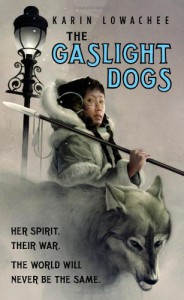

In 'The Gaslight Dogs', Karin Lowachee has built a powerful, convincing vision of a world in the throes of a familiar colonial conflict, has populated it with real people who have very little in common except their enforced servitude and then added an original, credible supernatural twist that gives the story its edge.
The first thing that hit me about 'The Gaslight Dogs' was the quality of the writing. Language here isn't a thin skin stretched over the bones of a clever plot, it's an invitation really to see the world that Karin Lowachee has created, to take in its sights and scents, its beauty and its ugliness with the fresh eyes and nose of a stranger. It's not language designed to get you to the next piece of dialogue or the next action scene as competently as possible. Nor is it purple prose of the over-long self-indulgent guitar solo kind. Its language that says: take the time to take in the place or you will not understand the journey.
This story is really two linked journeys, neither of which is voluntary and both of which are shaped by the obsession of a ruthless powerful old man with an insatiable hunger for conquest. We start with Sjennonirk, a young Aniwi spirit walker who is taken in chains from her home in the Arctic and brought south to a city built of brick and lit by gas, where high walls block off the view of the horizon in every direction. Then we meet a Captain Jarrett Fawle, a young man who, uncomfortable and unloved at home, only feels free when leading his men to hunt and kill the aboriginal tribes as part of the push to expand his country's territory. He is sent home on leave and kept there until he complies with his father's will. His father, General Fawle, is the man whose plan for power effectively enslaves both Sjennonirk and Captain Fawle. He sees them both as commodities to be exploited and makes their freedom conditional on meeting his goals.
It's easy to see 'The Gaslight Dogs' as a story about the ruthless use of technology by colonial powers to gain territory, to paint a picture of genocide and environmental destruction but I see it as more than that. This isn't a 'good guys stand up to bad guys' kind of story. Nor is it the Star Wars fantasy of brave rebels opposing an evil empire. The power of this story comes from its refusal to move to that Big Picture, Sweep Of History perspective. It stays focused on Sjennonirk and Captain Fawle and the choices that they make. Neither is a hero. Neither wants to be on the journey that General Fawle has sent them on. In their different ways, each just wants to go home. Each of them both representative of and outsiders to their own cultures. Their struggle is not primarily a clash of cultures but of two individuals pushing against their fate.
It seemed to me that a lot of this story was about the power of belief. Sjennonirk believes in the power of her ancestral spirits. She feels the little wolf inside her and knows its hunger. Her world view is one of respecting the spirits who, through her and spirit walker like her, protect her people. She is hungry for nothing more than to live at home in peace. She is passive, stoic and pragmatic, except when her wolf wakes.
Captain Fawle is not a believer. He does not believe in the Seven Deities of his people, nor in the destiny of his country, nor in the possibility of being loved by his father. He fills the hole where his belief should be by winning the respect of his men when on the frontier and with alcohol when at home in the city.
When 'The Gaslight Dogs' was published in 2010, it was billed as the beginning of the 'Middle Light' series. It works well as a standalone book but I still holding out hope that Karin Lowachee will find the time to come back to this world.










